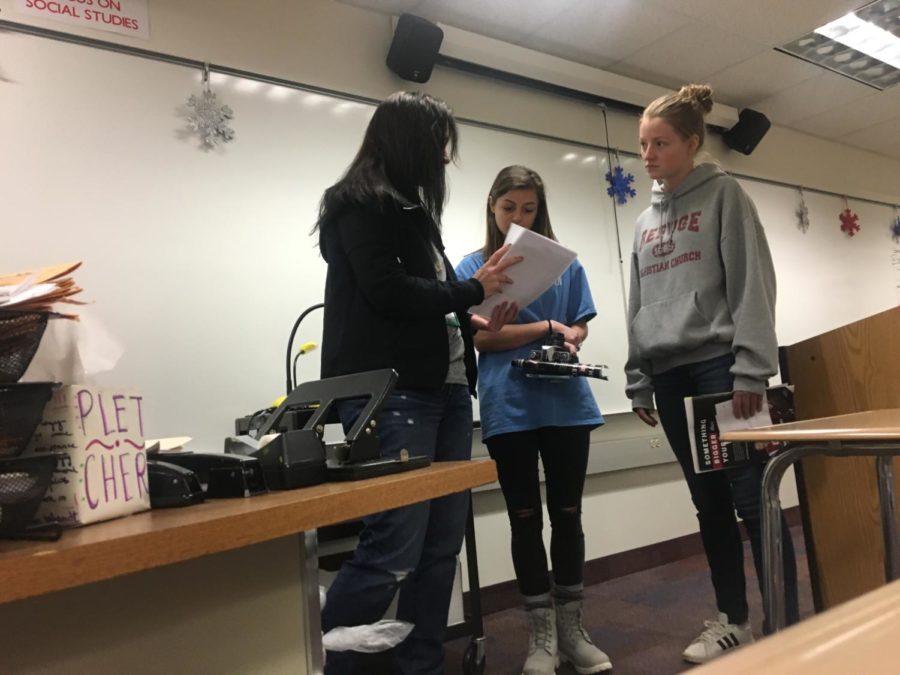Robin Pletcher, AP Psychology and K-8 Mentoring teacher, speaks to applicants for the future class of mentors. She said, “They are representing the high school and going into these other schools. I need to be able to know that they are responsible and reliable and that I can trust them being out of the building for that G3 period.”
According to Robin Pletcher, AP Psychology and K-8 Mentoring teacher, ISTEP testing at the Carmel elementary and middle schools caused the schedules to be different so a few mentors partnered up throughout the week.
“Sometimes it was like three mentors with one kid which the kid kind of thought it was a special day because they got all that special high schooler attention,” she said. “I know at one of the schools, a bunch of them got together in a room with like two kids and there was eight mentors, and the kids just loved it. They thought it was nice getting all that attention from the cool high schoolers.”
Senior and mentor Emily Klotz said she joined the program to gain more experience working with children.
“I’ve always wanted to be an elementary teacher for as long as I remember so I’ve done education professions and things like that,” she said. “I worked at a daycare so I’ve done a lot of things with kids and so when I heard about this program I was like ‘That’s pretty much perfect to have the one-on-one connection with a student.’”
Related Posts:
- Stereotypes faced by twins shape expectations, identity Junior Luke Boyce would describe his identical twin brother, junior Andrew “Drew” Boyce, as a built-in best friend. The two of them share a multitude of interests and have many friends in common, and they’ve always gotten along exceptionally well.…
- Q&A with junior Tege Holt on music journey How did you get interested in playing music? I was four years old in the back of my dad's truck and the song “Pink Houses” came on the radio. I'm not really sure what it was. I decided I wanted…
- Personality typing systems impact self-discovery, decision-making Personality typing systems are reexperiencing widespread attention. According to the Harvard Business Review, personality testing is a $500 million industry and grows by 10 to 15% annually. Psychology Today reports that 80% of Fortune 500 companies used the Meyer-Briggs Type…

































![AI in films like "The Brutalist" is convenient, but shouldn’t take priority [opinion]](https://hilite.org/wp-content/uploads/2025/02/catherine-cover-1200x471.jpg)









































![Review: “The Immortal Soul Salvage Yard:” A criminally underrated poetry collection [MUSE]](https://hilite.org/wp-content/uploads/2025/03/71cju6TvqmL._AC_UF10001000_QL80_.jpg)
![Review: "Dog Man" is Unapologetically Chaotic [MUSE]](https://hilite.org/wp-content/uploads/2025/03/dogman-1200x700.jpg)
![Review: "Ne Zha 2": The WeChat family reunion I didn’t know I needed [MUSE]](https://hilite.org/wp-content/uploads/2025/03/unnamed-4.png)
![Review in Print: Maripaz Villar brings a delightfully unique style to the world of WEBTOON [MUSE]](https://hilite.org/wp-content/uploads/2023/12/maripazcover-1200x960.jpg)
![Review: “The Sword of Kaigen” is a masterpiece [MUSE]](https://hilite.org/wp-content/uploads/2023/11/Screenshot-2023-11-26-201051.png)
![Review: Gateron Oil Kings, great linear switches, okay price [MUSE]](https://hilite.org/wp-content/uploads/2023/11/Screenshot-2023-11-26-200553.png)
![Review: “A Haunting in Venice” is a significant improvement from other Agatha Christie adaptations [MUSE]](https://hilite.org/wp-content/uploads/2023/11/e7ee2938a6d422669771bce6d8088521.jpg)
![Review: A Thanksgiving story from elementary school, still just as interesting [MUSE]](https://hilite.org/wp-content/uploads/2023/11/Screenshot-2023-11-26-195514-987x1200.png)
![Review: "When I Fly Towards You", cute, uplifting youth drama [MUSE]](https://hilite.org/wp-content/uploads/2023/09/When-I-Fly-Towards-You-Chinese-drama.png)
![Postcards from Muse: Hawaii Travel Diary [MUSE]](https://hilite.org/wp-content/uploads/2023/09/My-project-1-1200x1200.jpg)
![Review: "Ladybug & Cat Noir: The Movie," departure from original show [MUSE]](https://hilite.org/wp-content/uploads/2023/09/Ladybug__Cat_Noir_-_The_Movie_poster.jpg)
![Review in Print: "Hidden Love" is the cute, uplifting drama everyone needs [MUSE]](https://hilite.org/wp-content/uploads/2023/09/hiddenlovecover-e1693597208225-1030x1200.png)
![Review in Print: "Heartstopper" is the heartwarming queer romance we all need [MUSE]](https://hilite.org/wp-content/uploads/2023/08/museheartstoppercover-1200x654.png)




